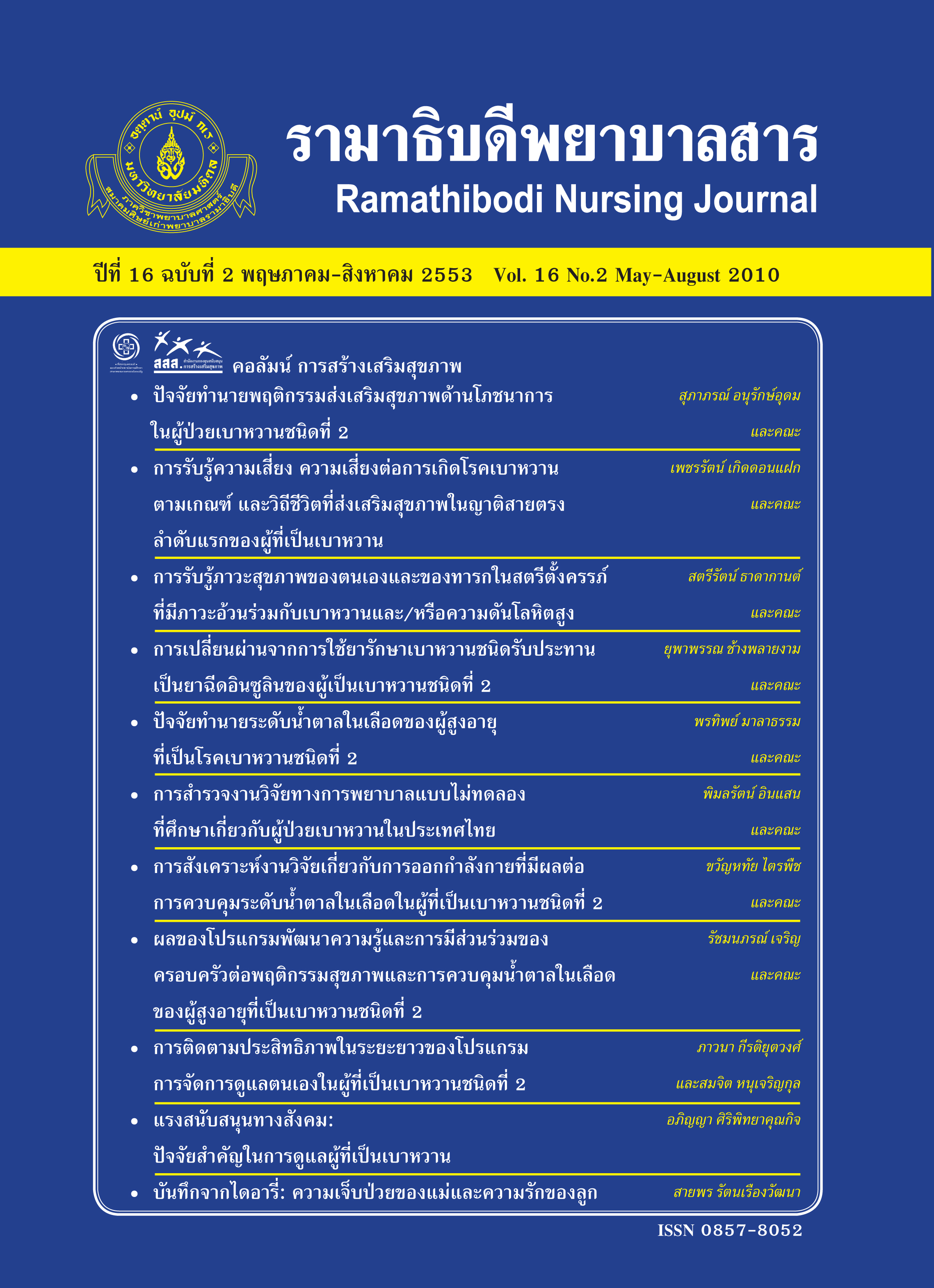การติดตามประสิทธิภาพในระยะยาวของโปรแกรมการจัดการดูแลตนเองใน ผู้ที่เป็นเบาหวานชนิดที่ 2
Main Article Content
Abstract
บทคัดย่อ
การศึกษานี้มีวัตถุประสงค์เพื่อติดตามผลของโปรแกรมการจัดการดูแลตนเองในผู้ที่เป็นเบาหวานเมื่อครบ 26 เดือน หลังเข้าร่วมโปรแกรมฯ และศึกษาสิ่งสนับสนุน อุปสรรค และการบริการที่ต้องการจากเจ้าหน้าที่สุขภาพในการคงการดูแลตนเองอย่างต่อเนื่อง กลุ่มตัวอย่างเป็นผู้ที่เป็นเบาหวานชนิดที่ 2 ที่ได้เข้าร่วมโปรแกรมการจัดการดูแลตนเองสำหรับผู้ที่เป็นเบาหวานตั้งแต่ปี พ.ศ. 2547 จำนวน 29 ราย เก็บข้อมูลโดยตอบแบบประเมินความรู้ กิจกรรมการดูแลตนเอง และคุณภาพชีวิต รวมทั้งตรวจค่าน้ำตาลสะสม เมื่อครบ 26 เดือน หลังจากเข้าร่วมโปรแกรมฯในปี พ.ศ. 2549 กลุ่มตัวอย่าง 8-10 คนต่อกลุ่มจำนวนจะได้รับการสนทนากลุ่ม (focus group)กลุ่มละ 2 ครั้ง บันทึกข้อมูลด้วยเครื่องบันทึกเสียง วิเคราะห์ข้อมูลด้วยสถิติความแปรปรวนแบบวัดซ้ำทางเดียว โดยนำข้อมูลจากการวิจัยประสิทธิภาพของโปรแกรมการจัดการดูแลตนเองที่ประเมินก่อนเข้าร่วมโปรแกรม หลังเข้าร่วม 3 และ 6 เดือน มาร่วมวิเคราะห์ด้วย ข้อมูลจากการสนทนากลุ่ม ใช้การวิเคราะห์เนื้อหา ผลการศึกษาพบว่าค่าเฉลี่ยคะแนนความรู้ กิจกรรมการดูแลตนเอง และคุณภาพชีวิตเมื่อครบ 26 เดือน น้อยกว่า 3 เดือน และ 6 เดือน (p > .05, p < .05,p >.05 ตามลำดับ) และมากกว่าก่อนเข้าร่วมโปรแกรมฯ (p < .05, p > .05, p > .05 ตามลำดับ)และค่าน้ำตาลสะสม เมื่อครบ 26 เดือน มากกว่า 3 เดือน และ 6 เดือน อย่างมีนัยสำคัญทางสถิติและมากกว่าก่อนเข้าร่วมโปรแกรมฯ แต่ไม่แตกต่างกันอย่างมีนัยสำคัญทางสถิติ ข้อมูลจากการสนทนากลุ่มพบว่าสิ่งสนับสนุนให้มีการจัดการดูแลตนเองต่อเนื่อง คือ การได้รับความรู้เกี่ยวกับการดูแลตนเอง การควบคุมตนเอง และครอบครัว สิ่งที่เป็นอุปสรรคต่อการจัดการดูแลตนเองอย่างต่อเนื่อง คือ ความรับผิดชอบในเรื่องการงานและครอบครัว มีสถานการณ์ชีวิตอื่นแทรกและปัญหาการควบคุมตนเอง และกิจกรรมที่ต้องการจากเจ้าหน้าที่สุขภาพในการคงไว้ซึ่งการดูแลตนเองอย่างต่อเนื่อง คือ การจัดกิจกรรมการกระตุ้นเตือนทุก 3 เดือน ผลจากการศึกษานี้ควรนำไปพัฒนารูปแบบโปรแกรมการกระตุ้นเตือน และนำไปใช้ในผู้ที่เป็นเบาหวานชนิดที่ 2ที่ได้เข้าร่วมโปรแกรมการจัดการดูแลตนเองในระยะหลัง 6 เดือนขึ้นไป เพื่อช่วยให้กลุ่มตัวอย่างคงการดูแลตนเองได้อย่างต่อเนื่องต่อไป
คำสำคัญ : การติดตามผล, การจัดการดูแลตนเอง, เบาหวานชนิดที่ 2, ความรู้เกี่ยวกับเบาหวานคุณภาพชีวิต
Abstract
The purpose of this study was to follow-up of the effectiveness of a selfmanagementprogram at 26 months after completing a self-management program. Inaddition, supporting factors, barriers, and need of services from health care providersto maintain their continuity of self-care management were explored. Twenty-ninepersons with type 2 diabetes who had received the self-management program since2004 were recruited in the study. Knowledge about diabetes, self-care activities,quality of life, and glycosylated haemoglobin (GHB) were assessed at 26 monthsafter receiving the program in 2006. A focus group interview consisting of eight toten participants per group were conducted and data were recorded by a tape-recorder.Each of the three groups was interviewed twice. The data from the self-managementprogram at baseline, 3 months, and 6 months were included for analysis. One-wayrepeated measures analysis of variance were used to analyze quantitative data.Qualitative data from the focus group interview were analyzed using content analysis.The results revealed that the mean scores of knowledge about diabetes, self-careactivities, and quality of life at 26 months were lower than those at 3 months and 6months (p > .05, p < .05, p >.05, respectively), but higher than those at baseline (p < .05,p > .05, p > .05, respectively). The mean GHB at 26 months was significantly higherthan that at 3 and 6 months (p < .05) and higher than that at baseline, but notstatistically significant. Supporting factors to maintain their continuity of self-caremanagement consisted of self-care knowledge, self-control, and support from familymembers. Barriers for maintaining self-care practices included work and familyresponsibilities, life events, and self-control difficulty. An encouraging programevery 3 months for maintaining continuity of self-care management from health careproviders are needed. Findings in this study suggest that an encouraging programshould be implemented after a 6-month period in persons with type 2 diabetes whoreceive an intensive diabetes self-management program for maintaining continuity ofself-care management in a long run.
Keywords : Follow-up, Self-management, Type 2 diabetes, Knowledge about diabetes,Quality of life
Article Details
บทความ ข้อมูล เนื้อหา รูปภาพ ฯลฯ ที่ได้รับการตีพิมพ์ในรามาธิบดีพยาบาลสาร ถือเป็นลิขสิทธิ์ของวารสาร หากบุคคลหรือหน่วยงานใดต้องการนำทั้งหมดหรือส่วนหนึ่งส่วนใดไปเผยแพร่หรือเพื่อกระทำการใด ใด จะต้องได้รับอนุญาตเป็นลายลักษณ์อักษรจากรามาธิบดีพยาบาลสารก่อนเท่านั้น


